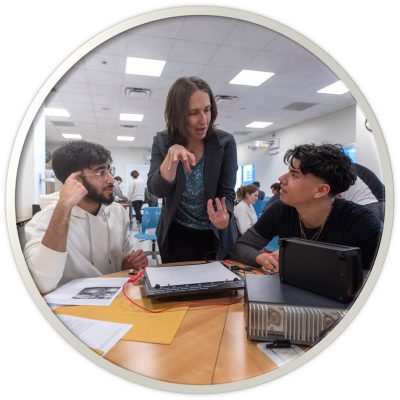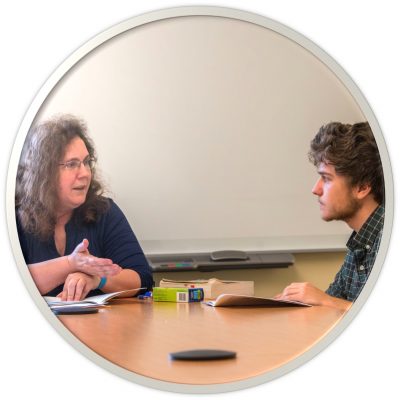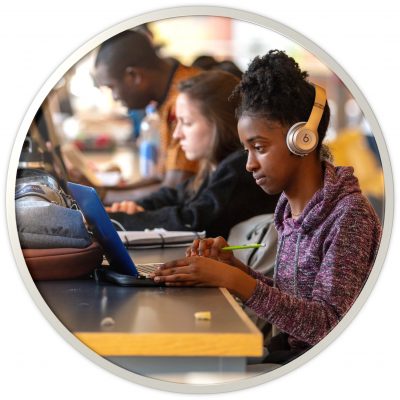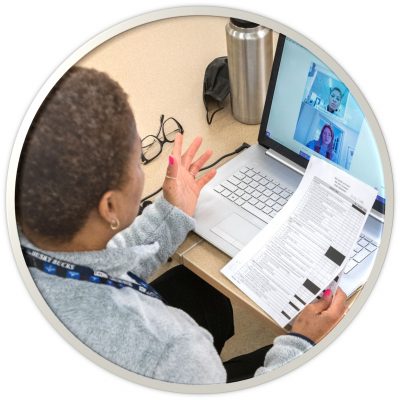Advising and Mentoring: Supporting Your Graduate Students
Supporting Your Graduate Students
The guidance that you offer through mentorship and advising can be transformative and is a critical factor in graduate students’ academic success and well-being. This topic provides you with resources to help you provide the best support to your graduate students. Are you a new graduate faculty advisor? Be sure to check out our Graduate Faculty Onboarding resource!

Advising & Mentoring
These resources will help you with one-on-one advising so you can be perceptive to the needs of your students, and thus allow them to do their best work in their graduate program.
The Graduate Catalog: Advisory System
Degree programs are planned by the advisory committee after consultation with the student, unless a field of study has established a uniform curriculum. There is considerable flexibility in meeting special needs insofar as these are consistent with the regulations of The Graduate School. A degree program may entail coursework in more than one field of study, but each program must include a coherent emphasis within one existing field of study and area of concentration, if applicable. You can view full the details on this advisory system in The Graduate Catalog.
The Graduate School’s Graduate Faculty Onboarding Page
The Graduate Faculty Onboarding page provides a variety of resources you will find useful as you begin to advise and mentor graduate students at the University of Connecticut. These resources include both general advice on how to mentor graduate students and relevant information about specific UConn policies affecting graduate students that you need to be aware of as you advise students on their course of study.
Being a Career Counselor for Your Advisee
To honor the concept of “Career Everywhere,” the Center for Career Readiness and Life Skills is committed to partnering with faculty and staff to provide them with information, resources, tools, and referral language to help empower our students to identify and achieve their career aspirations.
The Center for Career Readiness and Life Skills has co-developed an online Inclusive Career Conversations Training: Reducing Biases and Career Disparagement & Bullying, which takes about 45 minutes to complete and consists of five interactive and self-paced modules. By completing the modules, you can:
- Increase your awareness about what characterizes healthy and unhealthy career conversations, both as the contributor and recipient of career advice;
- Equip yourself with knowledge and tools to engage in supportive career conversations.
To enroll in the Inclusive Career Conversations Training: Reducing Biases and Career Disparagement & Bullying, please reach out to kay.gruder@uconn.edu.
Graduate Student Mentoring: A Mentor’s Guide
In collaboration with faculty, professional staff, and graduate students from across the University and endorsed by the Graduate Faculty Council, The Graduate School developed "Graduate Student Mentoring: A Mentor's Guide," a set of best practices for graduate faculty and departments at UConn. The practices outlined are intended as a baseline to graduate student mentoring, and you may find it helpful to include the approaches discussed in your own mentoring and advising relationships. In addition to the best practices discussed in the guide, departments and programs are also encouraged to develop specific guidelines as it pertains to their programmatic needs.
Network for Enriched Mentorship (NEM)
The Graduate School's Network for Enriched Mentorship (NEM) is a UConn-wide interdisciplinary mentoring network for all graduate students, with a special focus on minoritized graduate students and those who come from backgrounds that may disadvantage them. Through NEM, graduate students can find mentors to talk with them about issues that arise outside of their coursework and dissertations. We hope that by connecting students with mentors who have experience navigating obstacles (for example, systemic bias, personal hardship, alternative career trajectories) or who can be effective and accountable allies, more students will feel supported and assertive in their graduate careers and beyond. If you haven't already, we invite you to apply to be a mentor.
Edward C. Marth Mentorship Award
The UConn AAUP established the annual Edward C. Marth Mentorship Award to recognize the leadership and dedication of Edward Marth and to encourage and reward outstanding mentoring of graduate students by UConn Graduate Faculty members.
Timely Topics
Timely Topics is a series of opportunities to engage with subject matter experts on topics relevant to those who support and advise graduate students and programs. Slides and recordings of each session are available on the Timely Topics webpage and graduate faculty are encouraged to attend relevant sessions.
Topics covered include:
- Information for New Graduate Faculty Advisors
- Graduate Student Mental Health
- Advising and Mentoring Historically Excluded or Racially Oppressed Graduate Students
- Career Conversations
- Neurodiversity and the Advisor/Advisee Relationship
- Using Annual Reviews to Help Graduate Students Succeed
- Graduate Assistants: What Supervisors Need to Know
- How to Have Difficult Conversations
- Supporting Grad Students with Disabilities
- ...and more!

Advisement Meetings
An academic advisor can be a great source of knowledge and guidance. These resources can help advisors prepare for important advisement meetings and navigate challenges.
Annual Academic Reviews
Annual Reviews are critical for the success of your graduate students. As part of an ongoing effort to foster good graduate student mentoring and facilitate communication between graduate advisors and advisees, The Graduate School has developed resources that can help departments and advisors use annual reviews for doctoral and MFA students.
Student Resources for Guidance and Support
Access Contact Information for The Graduate School colleagues who can provide support and answers to graduate students, postdoctoral scholars, and those who work with them.
Information and Resources Related to Graduate Assistantships
The Information about Assistantships page provides relevant information for faculty and staff on administering assistantships, including what to consider before you offer an appointment, guidance on making offers, getting started as a GA, and completing or resigning an appointment.
Steps to a Successful Graduation
The Steps to a Successful Graduation Guide contains information on everything a graduate student needs to do to successfully graduate and prevent any degree auditing delays.
Separation from & Reinstatement to Graduate Study
Voluntary Separations (such as, academic leave, exit, program separation): Graduate students may need to step away from their academic studies or graduate assistant employment at some point during their graduate career. Voluntary separations may include academic leave, exit, or program separation, and the information on this page can help guide students toward the best option for their circumstances.
When students are ready to return to their studies, they will need to complete the Request Reinstatement to Graduate Study or Reinstatement from Academic Leave form.
For questions about voluntary separation or reinstatement, contact The Graduate School at gradseparation@uconn.edu.
Center for Students with Disabilities
The Center for Students with Disabilities (CSD) engages in an interactive process with each student and reviews requests for accommodations on an individualized, case-by-case basis. Depending on the nature and functional limitations of a student’s documented disability, they may be eligible for reasonable and appropriate accommodations.
Additional Support
Having someone talk through a challenging situation with you can open novel solutions that were not previously considered. Reach out to the Graduate Student and Postdoctoral Affairs Team for guidance and support.

Supporting Graduate Student Mental Health
As an advisor or supervisor, you can promote mental health and well-being through your academic and work expectations, check in with your students about their well-being, and connect them to campus resources and providers as needed. We have collected some resources below to help you determine when to refer a student for additional support and how to simply check in with your students to ask how they are doing.
Concerned About the Well-Being of a Student?
The Working with Students in Distress page provides information to help you support your students and refer them to the resources they may need to be healthy and successful. It is okay to ask a student how they are doing. To the student, you might be the only person that they see often enough to notice their behavior changes. Refer to the Q&A section provided on the page when determining resources for connection and/or referral.
Student Health and Wellness Red Folder and Trainings
The Red Folder is an electronic resource to help faculty and staff recognize, respond to, and refer students in distress. It contains important tips and information about a wide range of campus and community resources that are available for students.
In collaboration with faculty and staff members of the Academic Affairs Partnership Committee and with student input, UConn's Student Health and Wellness (SHaW) designed a series of online Brief Trainings to Support Student Well-Being, including how to respond to signs of distress, for faculty and staff.
Resources & Referrals for Graduate Assistants
The Graduate School has created an extensive list of Resources & Referrals to support Graduate Assistants. For additional guidance and support for both graduate students, faculty, and supervisors, please reach out to the Graduate Student and Postdoctoral Affairs Team.

Cultural Competency: Diversity & Inclusion
The University of Connecticut is committed to building a safe and inclusive community for all its members through diversity, equity, and inclusion. The resources referred to below are intended to help you in supporting the success of students from all backgrounds.
Supporting International Students
The Center for International Student and Scholar (CISS) relies on academic advisors to provide details related to international students' academic standing. To that end, they developed the Supporting International Students page, which describes the information CISS will be looking to academic advisors to provide and offers tips specifically for advising international students.
Center for Students with Disabilities
The Center for Students with Disabilities (CSD) engages in an interactive process with each student and reviews requests for accommodations on an individualized, case-by-case basis. Depending on the nature and functional limitations of a student’s documented disability, they may be eligible for reasonable and appropriate accommodations.
Undocumented Student Resources
The Office of Diversity and Inclusion developed a page to help connect undocumented UConn students with campus, legal, and community resources.
UConn’s Cultural Centers
UConn’s Cultural Centers/Programs serve as vital resources in support of the social, behavioral, and cultural needs of students. They also provide an important resource to the broader UConn community as a central point of reference for issues and historical context related to the particular demographic group represented by the center. The Cultural Centers/Programs also work collaboratively to bring light to issues that face the community of underrepresented populations at UConn.
Diversity, Equity, Inclusion, & Justice at UConn
UConn's Diversity, Equity, Inclusion, and Justice page serves as the University's central hub for diversity, equity, inclusion, and justice (DEIJ) information and initiatives and provides resources, opportunities for engagement, and celebrations of the many diverse communities who call UConn “home.”
InForm (Incident Reporting)
InForm is a tool to help the UConn community navigate reporting processes and supports available for a variety of incidents including bias, harassment, safety concerns, and other types of misconduct. InForm is available to anyone coming into contact with UConn, including students, faculty, staff, visitors, and community members who have a concern to report, including bystanders

Scholarly Misconduct
Below are resources that explain what is considered scholarly misconduct in the context of both research and academics, how to prevent misconduct, and what to do when you suspect that a student has committed an act of scholarly misconduct.
General Information on Scholarly Misconduct
At The Graduate School, we understand the importance of preventing and appropriately addressing scholarly misconduct in graduate studies. The Academic, Scholarly, and Professional Integrity Misconduct page provides specific resources and critical information to be utilized to prevent and address scholarly misconduct.
FAQs about Scholarly Misconduct
The FAQ-Scholarly Misconduct document highlights the most frequently asked questions, including the definition of scholarly misconduct, what activities constitute scholarly misconduct, and the University’s policy on scholarly misconduct for graduate students.
The Graduate Catalog: Scholarly Integrity & Misconduct
The Graduate Catalog outlines the Scholarly Integrity and Misconduct policy, definitions and procedures.
Flow Chart on Scholarly Misconduct
The Graduate School created a Flow Chart that gives a step-by-step guide to addressing allegations of scholarly misconduct.
Template Scholarly Misconduct Notification Letter
The Graduate School has provided a Template Letter for faculty to notify students of scholarly misconduct. The letter includes the allegation of scholarly misconduct, specific evidence of scholarly misconduct, any academic consequences and steps to appealing the reported scholarly misconduct.